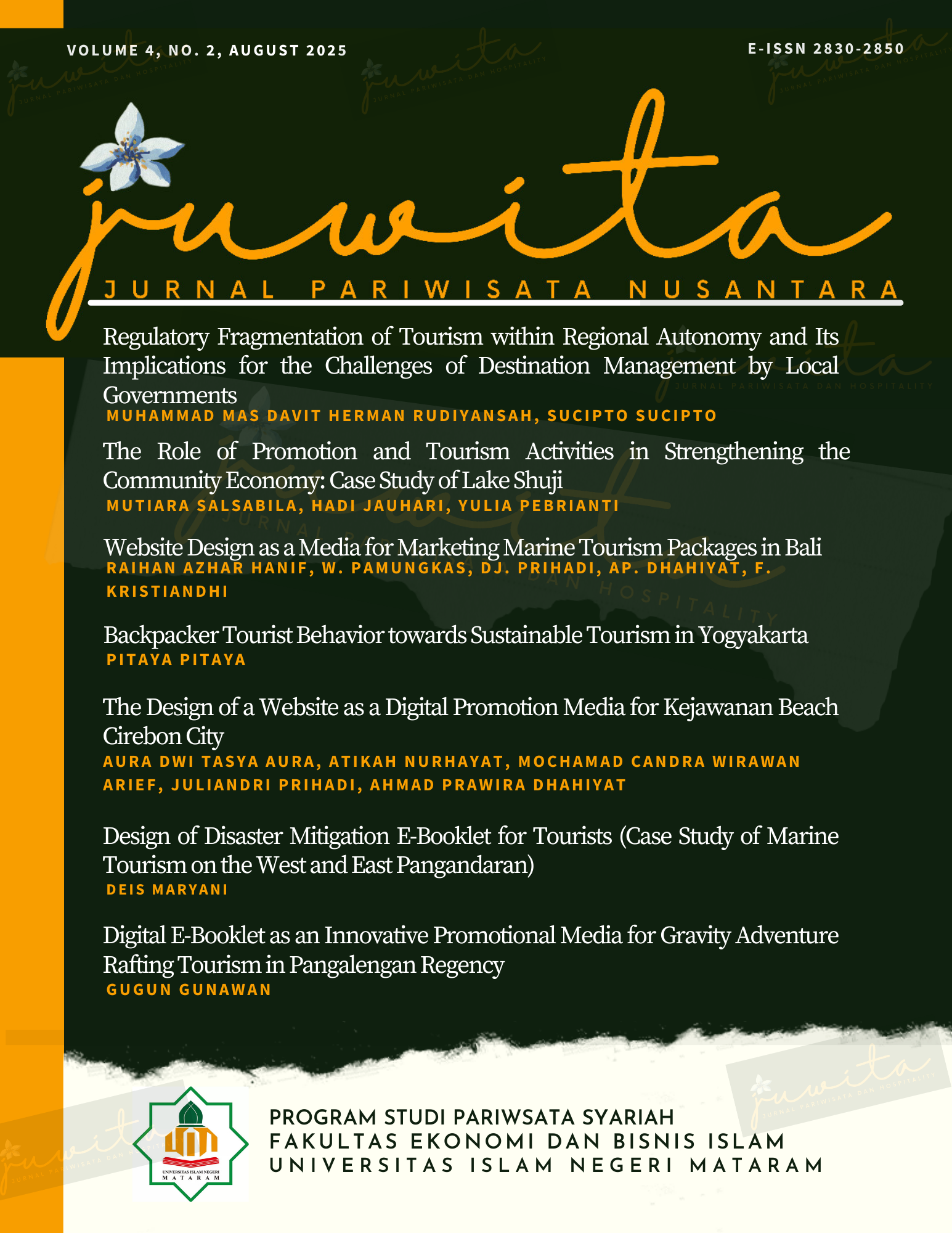Regulatory Fragmentation of Tourism within Regional Autonomy and Its Implications for the Challenges of Destination Management by Local Governments
Main Article Content
Abstract
Purpose: This study aims to analyze the issue of regulatory fragmentation in the management of tourist destinations by local governments within the framework of regional autonomy in Indonesia through a normative juridical analysis. The main focus lies on the disharmony of the relationship between the central and regional governments that impacts the effectiveness of tourist destination governance, with a case study of the management of the Borobudur Temple Area.
Method: Using a normative approach, this study examines legal provisions such as Law No. 10 of 2009 concerning Tourism and Law No. 23 of 2014 concerning Regional Government, as well as other implementing regulations and non-statutory legal documents. Analysis is conducted on the interaction and overlap between regulations, as well as their impact on the implementation of authority in the field.
Result: The results of the study indicate that although regional autonomy is regulated normatively, the practice of managing tourist destinations is still dominated by the central government, which tends to ignore the strategic role of the regions. This dominance not only weakens the capacity of regional decision-making but also creates inequality in the distribution of economic benefits, legal uncertainty for business actors, and social resistance from local communities. This study highlights the need for regulatory harmonization between the central and regional governments through a collaborative approach, strengthening regional institutional capacity, and actively involving local communities in policy formulation and implementation.
Contribution: A key contribution of this research is the proposed tourism destination governance model based on the principles of distributive justice, intergovernmental synergy, and public participation. By integrating constitutional law and public administration perspectives, this study emphasizes that decentralization must be implemented substantively, not merely as a formality. Strengthening a responsive, inclusive, and contextual regulatory framework is a key prerequisite for realizing a sustainable, equitable tourism sector capable of significantly improving the welfare of local communities.
Downloads
Article Details

This work is licensed under a Creative Commons Attribution-ShareAlike 4.0 International License.
References
Agustina, M. D. P. (2021). Model Pemberdayaan Ekonomi Lokal melalui Pengelolaan Desa Wisata. Diambil dari Portal Digital Penerbit Widina.
Akhyar, A., & Syarif, S. (2024). Eksplorasi Inovasi Kebijakan di Sektor Wisata Kabupaten Bima: Telaah dari Sudut Tata Kelola Pemerintahan Berkualitas. Jurnal Kajian Sosial Syntaxa Imperativa, Vol. 4(6), 832-843. Diperoleh dari Platform Doi Syntaxa.
Anas, A. A. (2024). Strategi Mempercepat Tata Kelola Pariwisata Borobudur: Fokus pada Struktur, Kelembagaan dan SDM. Portal Resmi KemenPAN-RB.
Biantoro, R., & Ma’rif, S. (2014). Analisa Dampak Sosial Ekonomi Wisata Borobudur terhadap Penduduk Lokal. Jurnal Perencanaan Wilayah dan Kota, Edisi 3(4), hlm. 1038-1047. Dapat diakses di Digital Library Universitas Diponegoro.
Candra, C. P. (2021). Rancang Bangun Aturan Ekonomi Kreatif Berbasis Tradisi Lokal pada Industri Pariwisata. Repositori Cepalo.
Darmawan, F. (2023). Ketegangan antara Konservasi dan Pariwisata Massal: Telaah Kasus Borobudur. Jurnal Vokasi Nusantara, Volume 10(1), hlm. 22-28. Diterbitkan oleh Universitas Indonesia Press.
Faruq, M. H. Al, Ruhpinesthi, G. E., & Ismaya, A. S. (2024). Penempatan Kembali Peran Naskah Akademik dalam Proses Legislasi di Indonesia. Jurnal Hukum De Juris, 24(2), 175-198. Terbitan Lembaga Penelitian Kemenkumham.
Firdaus, S. U., & Panjaitan, P. A. N. (2024). Penyusunan Sistem Hukum Responsif terhadap Perubahan Dinamika Kebijakan. Prosiding Hukum Tata Negara Indonesia, 2(1), 355-382. Sumber: Forum Ilmiah APHTN-HAN.
Habibi, M., & Zuhriyati, E. (2019). Kesenjangan Pendapatan Daerah Penghasil Pasca Desentralisasi Asimetris. Laporan Riset Universitas Muhammadiyah Yogyakarta.
Hamzah, F., Hermawan, H., & Wigati. (2018). Pengaruh Ekonomi dari Aktivitas Pariwisata terhadap Penduduk Lokal. Jurnal Kajian Pariwisata, 5(3), 195-202. Terbitan STIE BSI Jakarta.
Haq, F. A., Musyafa, D. A., & Rosidin, U. (2025). Penyesuaian Kewenangan Antara Pemerintah Pusat dan Daerah dalam Struktur Negara Kesatuan. Jurnal Hukum Nasional Qanun, 2(2), 17-30. Terbit di Media Akademika Hukum Indonesia.
Hermawan, R., Wulandari, N. P., Magfiroh, V. S., & Hilman, C. (2025). Konsep Pendidikan Partisipatif untuk Mengurangi Kesenjangan Sosial. Jurnal Edukasi Islam Terapan, 1(3), 108-117.
Hilda, H. H. S., Munazih, M., & Kunarti, S. (2025). Pembentukan Koperasi Desa Berdasarkan Perspektif Hukum Administrasi Publik. Jurnal Legislasi USM, 8(2), 901-922.
Rohim, A. (2024). Evaluasi Efektivitas Otonomi Daerah dalam Memberdayakan Ekonomi Lokal. Jurnal Hukum Pattimura, 3(3), 178-191.
Rosika, C., Frinaldi, S. A., & Magriasti, L. (2023). Inovasi dalam Tata Kelola Pemerintahan Daerah Menuju Model Berkelanjutan. Jurnal Pengabdian Masyarakat Comservana, 3(8), 3037-3049.
Salam, S. N., & Kurniasih. (2025). Dampak Yuridis Putusan Mahkamah Konstitusi terhadap Arah Demokrasi Nasional. Jurnal Hukum dan Politik Nusantara, 3(1), 788-806.
Sasmi, E. K. (2022). Evaluasi Perencanaan Tata Ruang pada Kawasan Warisan Borobudur. Digital Library UNS Surakarta.
Sentanu, I. G. E. P. S., & Mahadiansar, M. (2020). Mendorong Peran Aktif Pemerintah Daerah dalam Pariwisata Ramah Lingkungan. Jurnal Administrasi Publik Nasional (JAPN), 8(1), 1-20.
Syaifuddin, A., & Purwohandoyo, J. (2019). Efek Sosial Ekonomi Wisata Candi Borobudur Terhadap Penduduk Sekitar. Jurnal Geografi Nusantara, 19(1), 18-31.
Taufik, T. A. (2001). Optimalisasi Teknologi Sebagai Sarana Pemberdayaan Masyarakat di Era Otonomi. BPPT Jakarta
.
Wibowo, A. (2024). Perspektif Lintas Disiplin terhadap Layanan Keuangan Digital: Kajian Hukum, Ekonomi, dan Teknologi. Yayasan PAT, 10(1), 1-158.
Winarno, B. (2004). Pendekatan Reinventing Government dalam Implementasi Otonomi Daerah. Jurnal Administrasi Kebijakan Publik Dialogue, 1(2), 1-24.
Yahya, T., Sarwani, R., Yarni, M., Helmi, H., & Pebrianto, D. Y. (2025). Tinjauan Kewenangan Daerah dalam Izin Pemanfaatan HPL di Area Sempadan Sungai. Disertasi Doktor Universitas Jambi.

